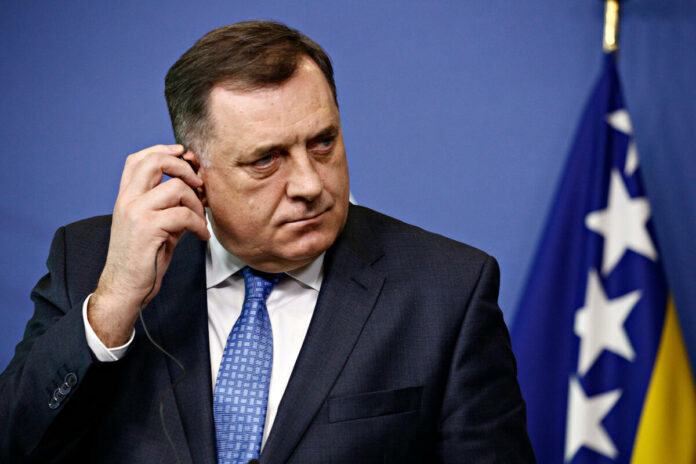What is the Process for the Potential Arrest of Dodik?
Nearly a full day after the Prosecutor’s Office of Bosnia and Herzegovina (BiH) instructed the leaders of Republika Srpska (RS) to appear for questioning, there has been no action taken.
The State Investigation and Protection Agency (SIPA) stated that while they did not reject the request from the Prosecutor’s Office of BiH to bring Milorad Dodik, Nenad Stevandić, and Radovan Višković in for questioning, they performed a security assessment that was deemed high-risk. This assessment has since been forwarded to the BiH Judicial Police.
Dodik, as the President of Republika Srpska, along with Višković, the Prime Minister, and Stevandić, the President of the Republika Srpska Parliament, announced at a press conference that they would not comply with the prosecution’s summons, labeling it as “unconstitutional.”
Esad Fejzagić, a lawyer and former judge of the Court of Bosnia and Herzegovina, informed Radio Free Europe (RSE) that while the legal framework surrounding the detention of suspects is clear, it remains uncertain who will execute it in this case.
Dodik, Višković, and Stevandić are under suspicion for actions that supposedly threaten the constitutional order, which according to the Criminal Code of BiH, could result in a five-year prison term and a ban from holding office.
The State Prosecutor’s Office previously announced that investigations have been ongoing since December 2024, driven by reasonable suspicion of an “attack on the constitutional order.” However, further details about the investigation and the suspects remain unspecified.
Leading up to the Prosecutor’s confirmation of the arrest order, Dodik made inconsistent remarks regarding whether he had received a request for questioning.
What’s the next step?
Fejzagić clarifies that there is no legally established deadline for searching for suspects without a warrant. Instead, it is at the discretion of police authorities to determine if continued searches are warranted.
A central warrant will then be issued, valid throughout BiH, making the individual wanted by all relevant Ministry of Interiors, the Border Police, and SIPA.
If these efforts are unsuccessful, an international arrest warrant may be pursued, involving “police authorities from all countries” in the search.
“However, the issue lies not in the legality of the actions but rather in determining who is tasked with carrying them out. Legally, it’s straightforward. The main complication pertains to this exact issue,” Fejzagić notes.
What if the RS Ministry of Interior intervenes?
RS Minister of Interior Siniša Karan stated on Banja Luka’s ATV television that no arrests would take place, asserting that his Ministry “safeguards the constitutional order, its institutions, representatives, and all citizens.”
He mentioned that his Ministry’s operations are governed by laws from the RS National Assembly, which classify SIPA, the Court, and the Prosecutor’s Office as “unconstitutional institutions” that are prohibited from operating within RS territory.
Fejzagić cautions that obstructing an arrest—if it occurs—could also be a criminal offense.
“Interfering with official duties constitutes a criminal offense. This is outlined in both the Criminal Code of BiH and the criminal codes of the entities,” asserts Fejzagić.
He adds that if court police confront potential force from another police agency, they will suspend their actions and notify the Court.
What does the Criminal Procedure Code indicate?
The BiH Criminal Procedure Code requires that those summoned to provide statements must justify their absence if they do not appear.
The prosecution will then review the reasons and can either request forced extradition or opt out of the interrogation.
The law further stipulates that if circumstances suggest a suspect may flee or leave the country, the court could prohibit them from departing their residence, potentially seizing their travel documents temporarily.
A suspect may be detained if there exists a risk of flight or legitimate concerns that they may “destroy, conceal, alter, or falsify evidence” crucial to the criminal investigation or influence witnesses.
What led to this?
The call for the detention of the top RS officials arises amid turbulent times following Dodik’s first-instance conviction on February 26 by the Court of BiH, resulting in a one-year prison sentence and a six-year public office ban for disrespecting the High Representative’s directives.
The day after the ruling, the RS Assembly passed unconstitutional laws aimed at banning the functioning of the Court and Prosecutor’s Office of BiH, SIPA, and the High Judicial and Prosecutorial Council within that entity.
However, the Constitutional Court of BiH intervened on March 7, issuing a temporary measure to halt the implementation of the RS Assembly’s recent laws.
The unilateral annulment of the state of BiH’s authority over a portion of its territory contravenes the Constitution of Bosnia and Herzegovina.
Yet, the effect of the Constitutional Court’s ruling on the RS authorities remains ambiguous, especially since the RS National Assembly enacted a law in 2023 declaring non-compliance with its decisions in the entity.
Immediately following the Constitutional Court’s ruling, Dodik declared that the laws would be enforced regardless.
Subsequently, RS authorities continued with their unconstitutional practices, including discussions on a new entity Constitution during a parliamentary session on March 12, which proposes RS to be recognized as a “state,” the formation of an entity army, and the dissolution of the RS Council of Peoples.
News


